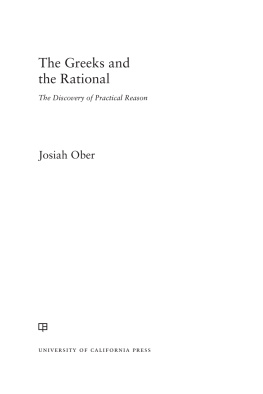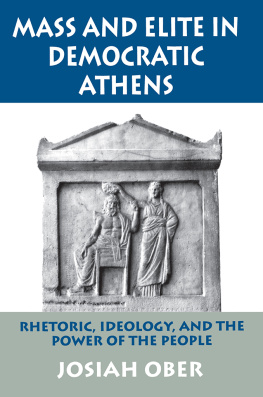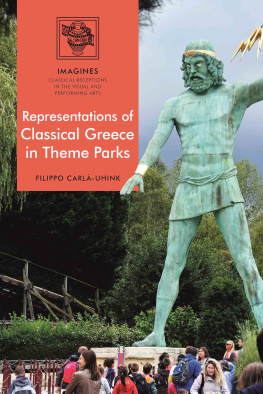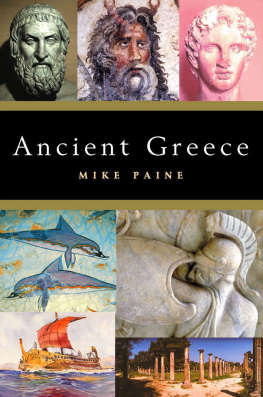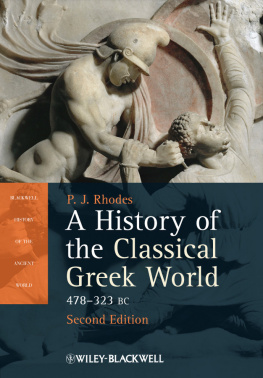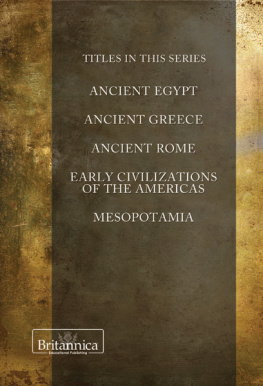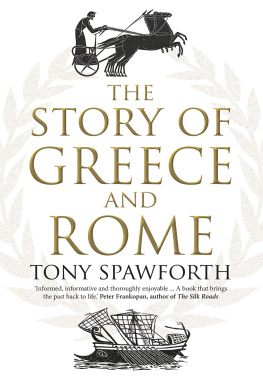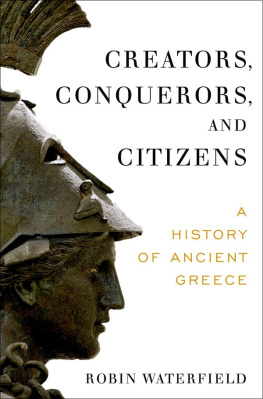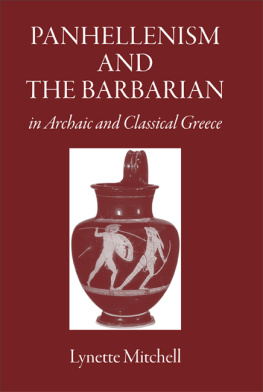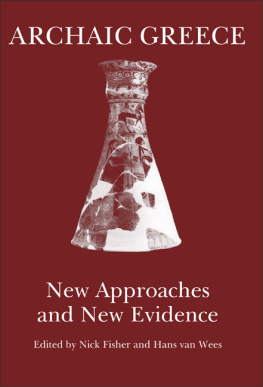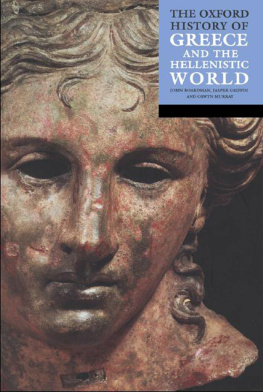
THE RISE AND FALL OF CLASSICAL GREECE
The PRINCETON HISTORY of the ANCIENT WORLD
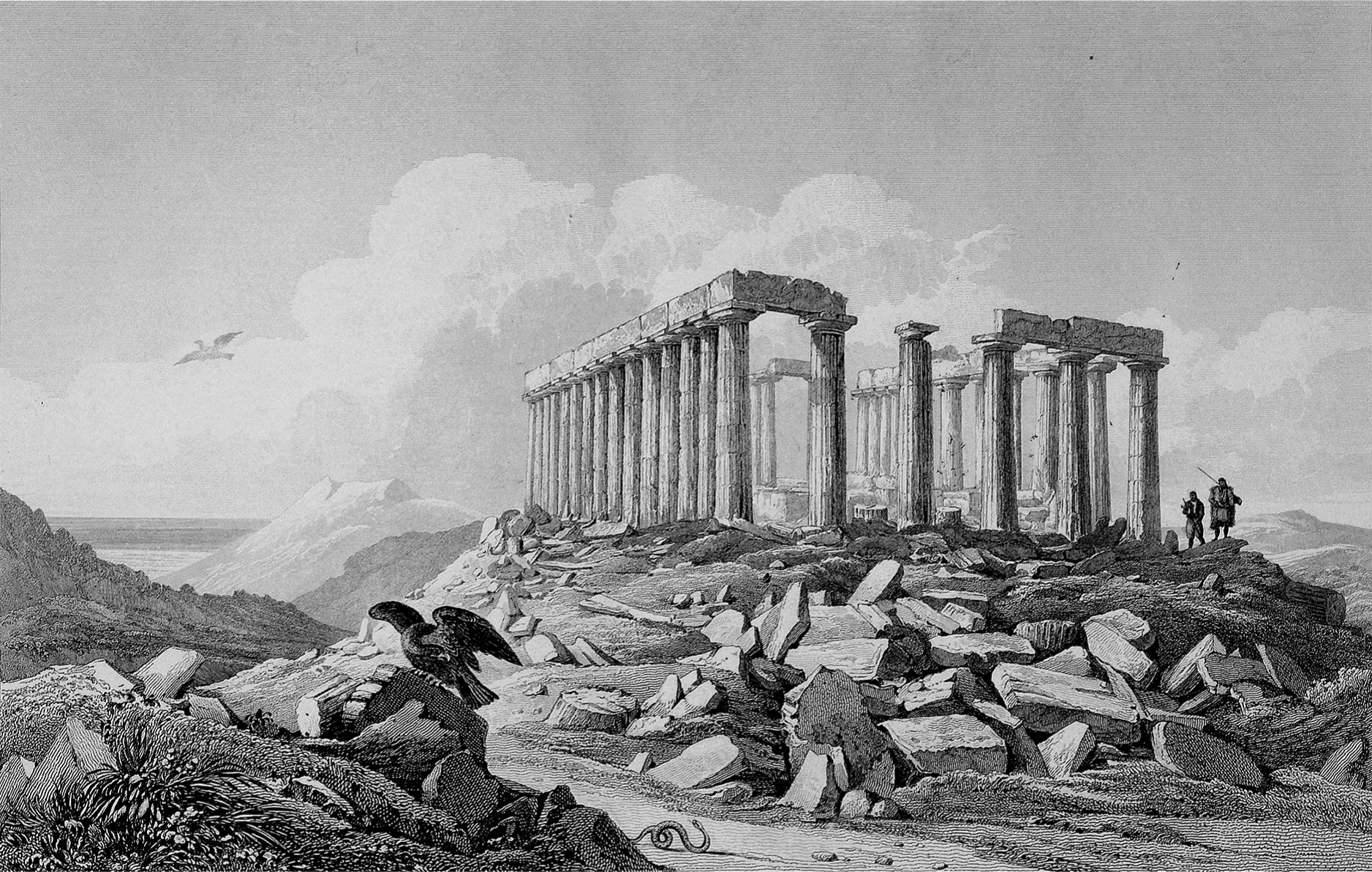
FRONTISPIECE Temple of Apollo at Bassae, in the mountains above the polis of Phigalia in the region of Arcadia (northern Peloponnese).
Engraving is plate 1 of Thomas Leverton Donaldson, Description of the Temple of Apollo Epicurius at Bassae, Near Phigalia.
London: Priestly and Weale, 1830 (Vol. 5 of James Stuart and Nicholas Revett, Antiquities of Athens: London, 1762 and following).
THE RISE AND FALL OF CLASSICAL GREECE
JOSIAH OBER
PRINCETON UNIVERSITY PRESS
Princeton & Oxford
COPYRIGHT 2015 BY PRINCETON UNIVERSITY PRESS
PUBLISHED BY PRINCETON UNIVERSITY PRESS
41 William Street, Princeton, New Jersey 08540
IN THE UNITED KINGDOM: PRINCETON UNIVERSITY PRESS
6 Oxford Street, Woodstock, Oxfordshire OX20 1TW
PRESS.PRINCETON.EDU
JACKET IMAGE: Engraving of northeast view of the Temple of Apollo Epicurius at Bassae near Phigalia, by Thomas Leverton Donaldson, from The Antiquities of Athens (London, 1830). Image courtesy of Aikaterini Laskaridis Foundation.
ALL RIGHTS RESERVED
Library of Congress Cataloging-in-Publication Data
Ober, Josiah.
The rise and fall of classical Greece / Josiah Ober.
pages cm. (The Princeton history of the ancient world)
Includes bibliographical references and index.
ISBN 978-0-691-14091-9 (hardcover : acid-free paper) 1. GreeceCivilizationTo 146 B.C. 2. Social changeGreeceHistoryTo 1500. 3. GreecePolitics and governmentTo 146 B.C. 4. City-statesGreeceHistory. 5. GreeceEconomic conditionsTo 146 B.C. I. Title.
DF77.O24 2015
938dc23
2014037623
BRITISH LIBRARY CATALOGING-IN-PUBLICATION DATA IS AVAILABLE
This book has been composed in Garamond Premier Pro and Penumbra Flare Std
Printed on acid-free paper.
PRINTED IN THE UNITED STATES OF AMERICA
1 3 5 7 9 10 8 6 4 2
for ADRIENNE

CONTENTS
JOSIAH OBER AND BARRY WEINGAST
|
IMAGES AND TABLES
PREFACE
I live in exceptional times. I can take for granted a global order defined by many independent states, some of them wealthy democratic federations governed ultimately by their citizens. Freedom, equality, and dignity are widely shared values. In states where citizens keep rulers in check, public authority protects individual rights and the rule of law pertains most of the time. These political conditions promote economic growth. The conjunction of democratic politics and a strong economy is, in practice, available only to affluent citizens of highly developed countries. But many people who do not yet enjoy those conditions aspire to them. Democracy and growth define the normal, although not yet the usual, conditions of modernity: Autocracy, while still prevalent, is regarded as aberrant, so that most autocrats pretend to be democrats. Economic stagnation is seen as a problem that demands a solution.
These conditions were not normal, or even imaginable, for most people through most of human history. But, for several centuries in the first millennium BCE, democracy and growth were normal for citizens in ancient Greece.
How that happened, and why it matters, is what this book is about.
New scholarshipmuch of it written by my colleagues at Stanfordhas helped to show why the political and economic conditions of modernity are, historically, so exceptionally rare. For the past several thousand years of human history, and until the eighteenth century, most people lived under the rule of autocrats who claimed a special relationship to divinity. The most successful of these rulers were masters of extensive empires, but most of their subjects lived perilously close to bare subsistence. Rulers stayed in power by extracting surplus from their subjects and distributing the loot to a ruling coalition. Under these conditions, access to institutions is limited, rights remain vestigial, and economic growth is usually low.
This premodern normal can be summed up as dominationso long as we remember that some subjects had input into government, through consultative assemblies or petition rights, that autocracy was sometimes limited by tradition or religious institutions, and that subjects often accept the legitimacy of royal authority. Domination pertained across most of the world until the eighteenth century. Then things began to change, first in a few Atlantic
The modern world is exceptional for its economic development and for its political development: not only for being (overall) wealthy, but also for the prevalence of democratic politics and the values that democracy sustains. I assume that few readers of this book would choose to live in premodern normal conditions of domination, even if their economic circumstances could be guaranteed. I assume that equally few would choose to live at the median economic level of a normal premodern society, even were it democratic. The citizens of modern developed countries need not make the choice between wealth and democracy. As we now know, democratic states are quite capable of achieving high levels of economic growth.
My colleague, Ian Morris, has shown that relatively high levels of development have historically been achieved under various political systems.
If we prefer our modern political and economic conditions to the premodern normal, we have good reason to inquire how we got here and to ask how likely it is that democracy plus wealth will become usual as well as normal. How is it that historically exceptional economic and political conditions came to be regarded as normal? Ought we to expect these conditions to persist where they currently pertain and to spread to the rest of the world? The prehistory of political and economic exceptionalism offers one relatively unexplored avenue by which we may address those questions.
The exceptional political conditions that I have summed up under the rubric of democracya social ecology of many independent states, federalism, citizen self-governance with its associated valueswere indeed rare before the eighteenth century. But they were not unknown. Societies with these features include the Dutch republics of the sixteenth century, the Italian city-states of the fourteenth and fifteenth centuriesand classical Greece in the fifth and fourth centuries BCE. In each case, the era of economic exceptionalism was limited, and in no case did premodern political rights or economic growth reach levels comparable to those enjoyed by many citizens of the most highly developed states in the past 150 years. But these early societies each experienced an extended period of economic growth and cultural achievement in the context of a historically remarkable extension of citizenship.
A comparative analysis of these (and other) historical cases of political and economic exceptionalism would go a long way toward answering important questions about the origins and sustainability of our modern condition. Before that ambitious comparative project can be undertaken, however, we need to know more about each of the relevant cases. We need to explain how each historically exceptional society arose when and where it did and how and why its political and economic exceptionality was terminated. By offering a new political and economic history of ancient Greece, this book contributes to that project.
Next page

